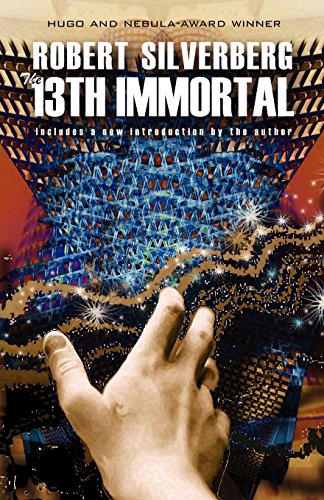
![]() The 13th Immortal by Robert Silverberg
The 13th Immortal by Robert Silverberg
The 13th Immortal is one of Robert Silverberg’s earliest novels, and though it’s not considered one of his great works, I certainly enjoyed it thoroughly and recommend it to those who like short science fiction novels from the 1950s. It’s a post-apocalyptic story about twelve immortals who have divided most of the world among themselves into separate Empires, leaving a few other places to whoever claims them. Those few key other spaces include a mutant city, a computerized city with no human inhabitants, and the larger space of Antarctica.
The main point Silverberg makes in this novel is that human beings are to blame for their own fall, and everyone in this new future realizes that the apocalypse was a “technology-born nightmare.” Therefore, there is a general commitment to live as much as possible without being dependent on technology:
“The old ways returned to the world — ways that had held sway for thousands of years, and which had regained ascendancy after the brief, nightmarish reign of the machine. Mankind still had machines, of course; life would have been impossible without them. But the Years of the Freeze were years of primarily hand labor, of travel by foot or by horse, of slow living and fear of complexity. The clock rolled back to an older, simpler kind of world — and froze there.”
This passage is representative of why I like Silverberg. No matter how many aspects of the novel seem dated, the themes are not. If anything, his concern for human dependency on technology is even more relevant now than when he wrote it. How much dependence on technology is too much? And is trying to use as little technology as possible really the correct reaction to the problems technological dependence can cause? That Silverberg is dated in his guesses about specific technologies does not matter in the least bit to me; his theme, like the best science fiction, will probably never become dated.
In the imagined future of the novel, Antarctica is in control of the mysterious 13th immortal, and he and Antarctica are at the heart of the mystery in the book. Who is the 13th immortal and what role will he play in the future of the world? What makes the immortal ruling Antarctica different from the other twelve? Why do the other immortals find Antarctica a threat? What is their opinion of this 13th immortal? And how are the rest of the characters connected to Antarctica?
In such a short novel, Silverberg can’t show us all of the other twelve immortals who rule the twelve empires. Instead, he introduces us to only Duke Winslow and Don Miguel, and they act as representative immortals in the story. Their relationship is also representative of how all the immortals feel about each other: Primarily they are all suspicious of assassins sent from the other immortals, because even though they will live forever if unharmed, they can be murdered. As a result of their fears, they live in cities with barriers erected around them, and their cities are highly organized, regulated, monitored, and protected spaces. Certainly Silverberg is telling us something about national borders and our rulers, as well as their fears and motivations.
The story is primarily about Dale Kesley, a simple farmer working within the empire of Duke Winslow. As the story begins, he is approached by the mysterious Dryle Van Alen who hints to Dale that there is more to his life than he suspects: Who is Dale Kesley really? This question introduces another set of major thematic concerns: Are we all Dale Kesley’s struggling to discover who we really are? How does our understanding of our own past change the way we see ourselves? And if we change the way we see our past, how does that change the way we envision our roles in our future lives and in the lives of others?
Dale Kesley goes on a journey, and this book is about his journey: His meeting with each Duke, each of whom wants something from him; his encounter with the mutants, particularly Lomark Dawnspear, who both repels him and gains his sympathy; his falling in love with the beautiful and high-spirited Narella, who, as Silverberg mysteriously tells us, “loved two men with one face”; his short stay at the technologically-run city; his eventual arrival in Antarctica and confrontation with the 13th immortal; and his final realizations of identity and purpose. In this story a man goes on a journey and a stranger comes to town. The man and the stranger are one and the same.
If you are looking for a groundbreaking work or want to read only the greatest hits of an author, then you can skip this one. Also, if when reading a review, you decided immediately to pass on a book described as “dated” in some way, then this book is also not for you. But for me, it has everything I want in a good science fiction novel from the 1950s: It’s got a clever and surprising plot, it reveals what a thoughtful man in the 1950s thinks the future might look like (“dated”), and it gives insight into aspects of human nature that are never “dated.” In other words, Silverberg, as always, is insightful in his analysis of human motivation and human nature, and if you read books for thematic truths rather than scientific facts, then you will find much to enjoy in The 13th Immortal.



Sounds good to me! Thanx, Brad!
Thanks for reading my review!